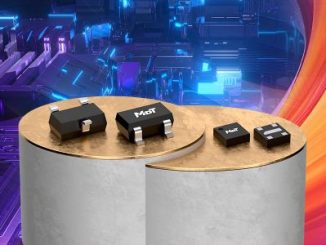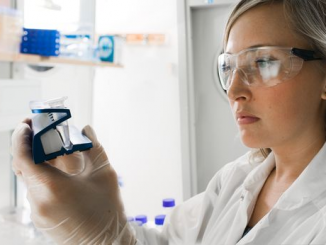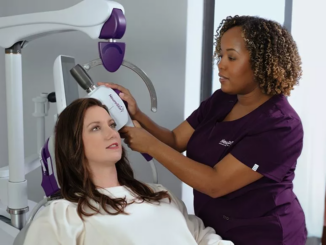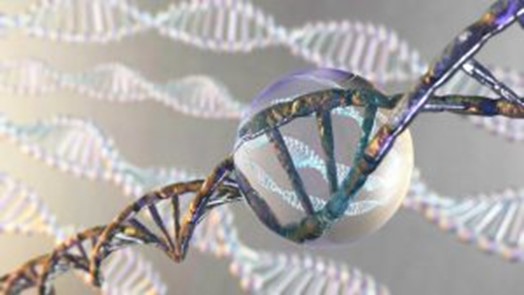
Using carbon-coated magnetic beads, biotech company Life Magnetics is embarked on a mission to solve the most difficult aspect of RNA therapeutics and at-home testing – the logistics of transporting fragile RNA molecules such as those in Covid vaccines. It also wants to apply its special technology to other big medical opportunities such as wastewater testing, cancer screening and, ultimately, room temperature RNA therapeutics.
The problem with ribonucleic acid is that it is a fragile molecule. Most living organisms try to destroy free RNA because they think it’s a virus. Even if it’s not destroyed in this way, RNA falls apart on its own in a few days. Now, Life Magnetics has developed a new tool in Covid-19 vaccine distribution, eliminating the need for cold storage.
Despite the transport limitations, the promise of RNA at-home testing and RNA therapeutics cannot be ignored, points out the company. Some experts estimate that by 2040, 60% of all drugs may be RNA drugs. RNA diagnostics aren’t just limited to detecting viruses like COVID-19, it’s also one of the best ways to detect cancer and a range of other conditions. Remember how DNA sequencing was a big deal in the early 2000’s? RNA sequencing is a super-charged version of DNA sequencing. It yields data sets that are 20x larger than DNA sequencing and RNA diagnostics are usually more informative for diagnostic applications.
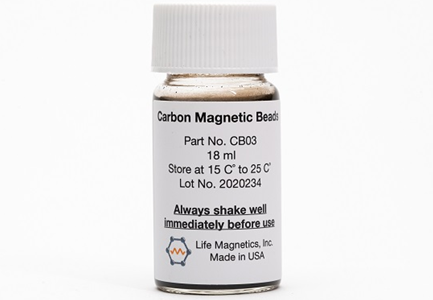
The scientists at Life Magnetics set out to solve the problem with RNA shipping and storage using a mechanism unique to carbon surfaces, leading to the development of their carbon-coated magnetic beads. This product includes only the carbon-coated magnetic beads without any buffers. It is designed for storage and shipping of RNA and for labs that formulate their own custom buffers. The beads are also integrated into handy diagnostic kits.
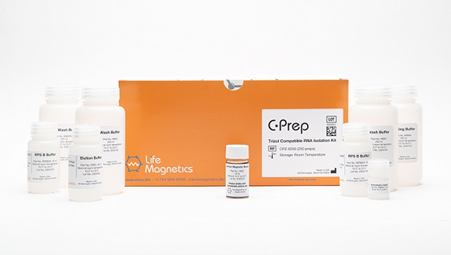
Now the next generation of RNA sample preparation is here, it says. Funded by the National Science Foundation and investors, along with the sale of its C-Prep magnetic beads and other diagnostic products, the company uses carbon-coated magnetic beads for RNA isolation and stabilization. For more than a decade, scientists have studied a unique interaction between carbon and single stranded nucleic acids, called pi-pi stacking. The unique effect can be leveraged for superior RNA purity and selectivity. The process is simple, low-cost, and compatible with a variety of lysis buffers and methodologies.
“There is a particular interaction called pi-pi stacking, which is strictly quantum mechanical in nature, so it’s a bit difficult to describe,” explains Kevin Hagedorn, president of the company and its manufacturing specialist. “However, what makes it unique is that it requires the nucleic acids to adopt a particular conformation and bind tightly to the carbon surface. This makes it difficult for the bound RNA to be attacked and helps stabilize it. Attaching and releasing RNA from the carbon surface uses Calcium, a milk additive, and EDTA, a common food preservative so the process is safe and scalable.”

“We’re currently selling the product to university labs and working on securing larger contracts. We’re working with Central Michigan University to simplify wastewater testing for COVID-19. This is an application where the longer you transport the sample the more RNA you lose which makes it difficult to say how many people in a community have COVID-19. If you can stabilize the sample once it’s collected you monitor individual communities with far higher accuracy and sensitivity.”
“Another related application we’re working on is at-home RNA urine testing. There are a range of conditions from prostate cancer to kidney transplant rejection that you can detect from the RNA in urine samples, by providing a simple method to collect and stabilize samples we can expand at-home testing which improves patient adherence and reduces costs.” It’s already being used in at-home colon cancer screening kits produced by another biotech company, Exact Sciences, a provider of cancer screening and diagnostic tests.
Based in Mt. Pleasant, Michigan, Life Magnetics has raised about $2 million from various investors, National Science Foundation grants and other sources to pursue its goals while developing its products along the way. About $1.3 million came recently from a crowd-funding by 250 Michigan investors. “The big application is room temperature RNA therapeutics. We don’t have the funding to go straight after those applications though, so we’re checking off easier applications to de-risk the technology for investors and generate early revenue,” notes Hagedorn.
“The first step was purification, which just required binding and release of RNA. However, it’s a common problem in labs. All biology labs that do RNA work need purification products. Now we’re on to at-home and environmental testing, which requires shipping. We’re starting to develop collaborations in synthetic RNA manufacturing and RNA drug delivery. Our research projects include making the carbon bio-absorbable so the particles don’t linger in the body.”
The long-term goal is delivery of RNA therapeutics. “Vaccines were the ideal first application for RNA therapeutics because you only take them once. One investor once asked, ‘what about drugs you take every day, we can’t have a -80C freezer in everyone’s house.’ That’s exactly the problem. For RNA technology to really take off there needs to be a way to deliver room temperature RNA therapeutics.” For more info, see www.magnetics.life.

